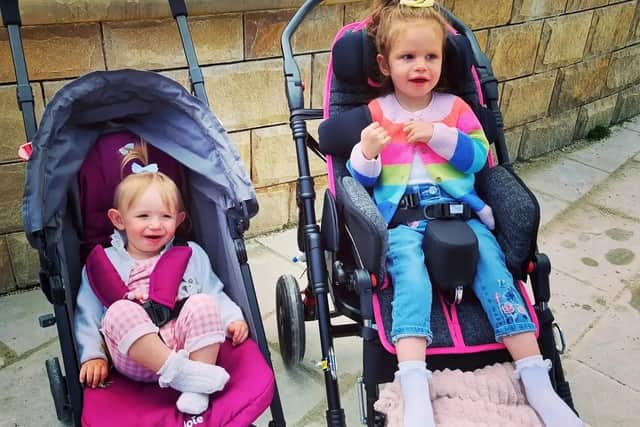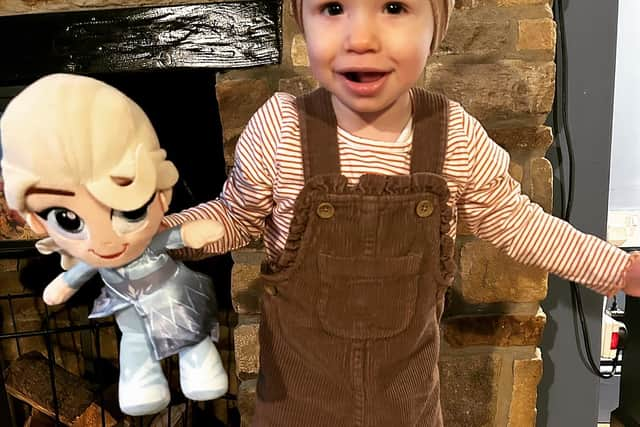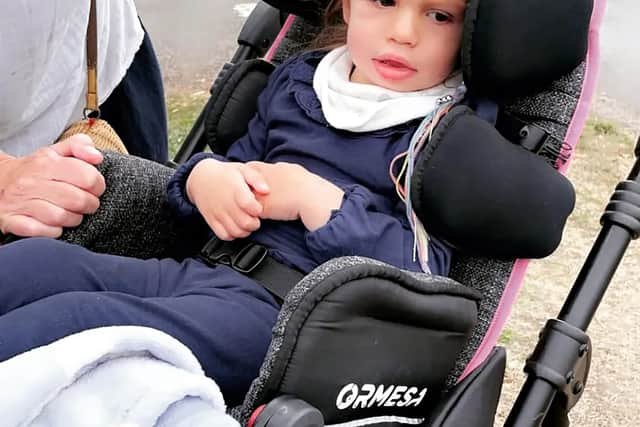Toddler with fatal disease cured with ‘miracle’ gene therapy treatment - but it’s too late to save sister
and live on Freeview channel 276
A toddler with a fatal genetic disorder has been saved by a “miracle” therapy treatment on the NHS.
Teddi Shaw suffers from deadly metachromatic leukodystrophy (MLD) and has become the first person in the UK to receive Libmeldy - a revolutionary treatment that corrects the genetic cause of MLD.
Advertisement
Hide AdAdvertisement
Hide AdThe rare condition is inherited and causes serious damage to the nervous system and organs, dramatically cutting life expectancy, but thanks to the therapy the 19-month-old girl has now been given the chance of a normal life.
The gene therapy, which replaces a defective gene inside the body’s cells, has a list price of £2.8 million, but NHS England reached agreement with the firm Orchard Therapeutics to offer it at a discounted price.


Teddi was diagnosed with MLD last April, at the same time as her three-year-old sister Nala. Children whose MLD starts before 30 months (the most common and the most rapidly progressing type) deteriorate quickly and usually die between the ages of five and eight. Those whose MLD starts between 30 months and six years of age typically have a life expectancy of 10 to 20 years more.
After undergoing the treatment that removes stem cells and replaces the faulty genes before re-injecting the treated cells, Teddi is now a healthy and happy toddler and shows no signs of the devastating disease she was born with. But sadly her family are still facing heartbreak because her sister Nala, who also suffers from MLD, is too advanced in her illness to benefit from the treatment.
Advertisement
Hide AdAdvertisement
Hide AdThe therapy, which is delivered as a one-off intravenous infusion, must be given before the irreversible damage caused by the disease progresses too far, according to guidance from the National Institute for Health and Care Excellence (Nice).


Teddi and Nala live with their parents Ally, 32, and Jake, 29, who say they feel “extremely privileged” that their youngest daughter was able to receive the treatment on the NHS.
Mrs Shaw said: “In April last year, our world was turned upside down when not one but both of our daughters were diagnosed with MLD. Being told our first daughter, Nala, wasn’t eligible for any treatment, would continue to lose all functions and die extremely young was the most heartbreaking and hardest thing to come to terms with.
“However, amongst the pain, was hope for our younger daughter, Teddi. We were told that a new gene therapy treatment had, luckily, recently been made available on the NHS.
Advertisement
Hide AdAdvertisement
Hide Ad“We are extremely privileged that Teddi is the first child to receive this on the NHS and grateful that she has the opportunity to lead a long and hopefully normal life. Without this treatment, we would be facing both our children being taken away.
“We can only hope that, one day, a treatment becomes available for all stages of MLD, and we feel strongly that it should be added to the newborn screening test to save more families from having to go through this heartache.”
Mrs Shaw said Tedd is doing “absolutely brilliant” since the treatment, and is walking, running and laughing all the time. She added: “Teddi is doing absolutely brilliant. She is walking, running, a chatterbox – absolutely no signs so far of MLD. She is an absolute character and has everyone around her laughing all the time.”


‘A miracle treatment’
Only around five children are born with MLD in England each year and it is caused by a lack of the enzyme Arylsulfatase-A, according to Nice. Without this enzyme, substances called sulphatides build up, eventually destroying the protective myelin sheath of the nervous system.
Advertisement
Hide AdAdvertisement
Hide AdAs a result, the nerves in the brain and the peripheral nerves stop functioning properly, causing symptoms including muscle weakness, sight and hearing loss, difficulty walking, loss of speech, cognitive decline and seizures.
Libmeldy is being made available on the NHS as a specialist service through the Royal Manchester Children’s Hospital, which is one of just five European sites administering the treatment - and is the only site in the UK.
Vivienne Clark, chairwoman of MLD Support Association UK, said she is “thrilled” that Teddi is now expected to lead a normal life.
NHS chief executive Amanda Pritchard added: “This is a huge moment of hope for parents and their babies who are born with this devastating inherited disorder, that can now be treated with a single round of revolutionary treatment at a specialist centre on the NHS.
Advertisement
Hide AdAdvertisement
Hide Ad“I am delighted that we have given this miracle treatment to the Shaw family at what must have been a horrendous time for them, and I would like to thank the staff at Royal Manchester Children Hospital for turning research into reality for Teddi and others who will benefit.”
Comment Guidelines
National World encourages reader discussion on our stories. User feedback, insights and back-and-forth exchanges add a rich layer of context to reporting. Please review our Community Guidelines before commenting.
